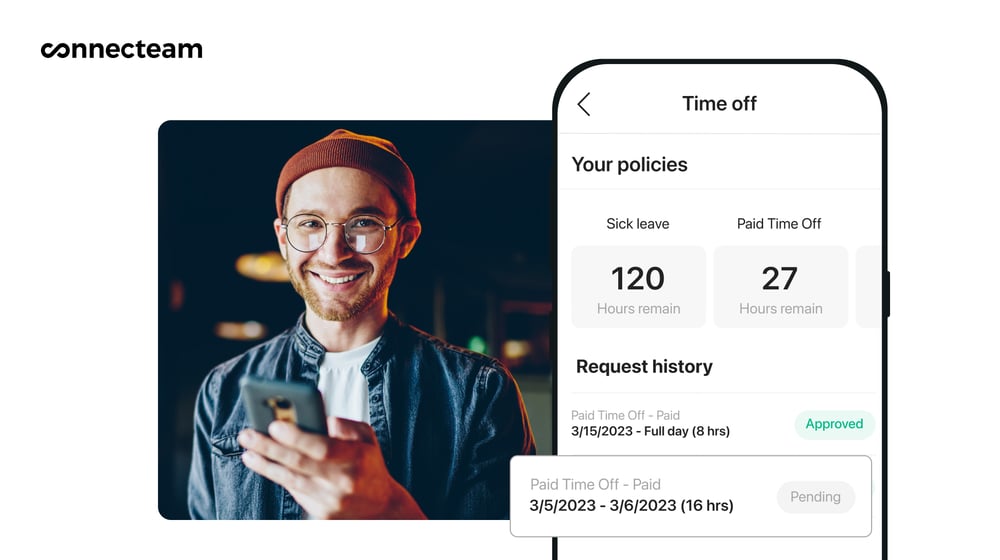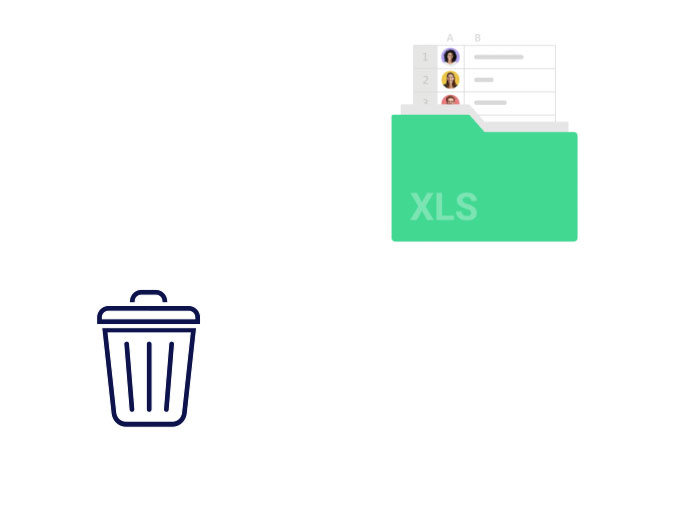Employees calling in sick are an unfortunate reality of any business. Here are expert tips on how to handle those dreaded last-minute sick calls.
We never know when the flu, a cold, or other illness will hit. The same is true for your employees.
Whether it’s a sudden bout of allergies or devastating news after a biopsy, workers may need to take time off to recover or to get treatment. Ideally, you would get some notice.
Sometimes, however, workers don’t call until the morning of their workday or even minutes before a shift to say they can’t make it.
Today, workers are as likely to text in a sick request as they are to call. But no matter how they communicate, here’s how to respond when an employee calls in sick.
Have a Policy in Place Before They Call
The best way to know what to say when an employee calls in sick is to have an absence management plan in place. This way, you’re prepared to cover the employee’s work and take care of business. You’ll be less flustered and more prepared to take the next steps.
Your plan should be stored in an online knowledge base or employee handbook your workers can access so that everyone will know what their responsibilities are if they need to call in sick. It should include how workers should contact you to report an illness. You can ask workers to call, but if someone is feeling unwell, they may not feel up to it. There’s also the problem that workers may not easily reach the right person.
An alternative is to ask employees to text you or send you a message on your company’s workplace chat platform. That way, managers can get the notice in real-time. Using software such as Connecteam’s Time Off app, they know exactly how to respond to an employee texting in sick.
You may be inclined to use Excel to document and track PTO, which is certainly a viable option. However, the benefit of an app like Connecteam is that managers can respond to time off requests, immediately document the absence, and update timesheets all in one place.
You might also consider whether to give workers the option of working from home when they’re unwell, if possible. Workers who are permitted to telecommute can return to duties faster after surgery or an illness. They may be able to take on light tasks even if they’re too sick to come to work. In fact, employees who work from home report fewer sick days off when compared with in-house workers.
Your absence policy could include elements such as:
- A clearly written procedure for absence requests
- A simple system to allow workers to easily contact you fast if they’re sick, such as using a work chat app
- A system for covering work or shifts by quickly communicating with the rest of the team to find out who is available to take over
- A requirement that last-minute sickness calls should happen before a certain time of day
- A requirement that prohibits workers from not calling and not showing up, unless they really can’t contact you
- A system that may require employees to obtain a doctor’s note if they’re away for a long time or have repeat absences
- A policy for dealing with repeat requests for sick days off due to chronic health issues
- Disciplinary measures in case a worker calls in sick when they’re not sick or abuses the sick day policy
A specific absenteeism policy can help, too, especially if you have some workers who routinely call in sick. This can help you track how often workers request time off. You’ll also be able to see if one employee’s requests and last-minute no-shows are becoming a problem. If you’re keeping track, you can dive in further and provide support if the worker is struggling.

Another good option for organizations is a paid time off (PTO) policy. This allows workers to take a specific number of days off per year for any reason, including vacation and sick days. PTO gives employees some flexibility, which can ensure they don’t call in sick when they just need a break to avoid overwhelm.
Pro Tip
Read up on the different PTO payout laws by state so you know what’s legally required of your company.
Check In With Your Employee
If a worker calls in sick at the last minute, first find out how they are feeling. About 44% of workers report being worried that they might get in trouble if they call in sick, so offer reassurance. After all, your first concern is your employees.

Find out if the worker has everything they need to get better. Ask when they might think they may recover or request a status update in a day or so.
Remind your worker of any policies in place, such as a request for a doctor’s note and encourage them to visit a doctor. You might want to ask if the worker needs additional time off work or if they’ll be back the next shift. This helps you plan ahead.
Keep Communication Open
After taking an initial employee call about a sick day, keep on communicating. While you want your employee to rest and get better, you also need updates. You need to know when your team member will return to work. You also need to find out whether their illness could be covered by the FMLA or the ADA, as this could impact how your organization responds.
After your worker’s first day off sick, make a phone call to your employee or text them. Ask them, “Feeling well today?” and again show genuine concern for their well-being. Find out if their original estimate of when they might be back at work is accurate. Also ask, “Do you need to take tomorrow off from work?”
Pro Tip
Take advantage of a time off management app, like Connecteam, which allows you to manage all things PTO from your desktop, tablet, or phone.
You can chat directly with your employees with in-app chat and employees can request time off directly from their phones. Track balances, create time off policies, and view all leave requests in one centralized location.
Get started with Connecteam for free today!
Keep Morale and Productivity High
It’s not just your ill worker you need to think about. When an employee has texted in sick, other team members may need to do more work or work overtime. They may need to come in when they’re not scheduled to work. All of this can affect their well-being and their mental health through added stress.
Talk to team members who are directly impacted by the sick days of a co-worker. Find out how much work these employees can do and what they need to succeed. You may want to boost these workers with incentives or rewards. And don’t forget to sincerely thank them for working hard to support a sick colleague.
Protect Your Organization
Leadership and managers understand that workers get sick. They’re also concerned some workers may take advantage of sick days or paid sick leave when they’re not ill. When workers call in sick at the last minute, it can mean added stress for their entire team. And it can mean your organization is paying for time off that could have been planned ahead.
To protect your organization, get familiar with the laws that govern sick time. Under the federal Family and Medical Leave Act (FMLA), workers may be allowed up to 12 weeks of job-protected leave for illness or to take care of a family member.

In addition, states such as Arizona, California, Connecticut, Michigan, New Jersey, Oregon, Massachusetts, Maryland, Rhode Island, Vermont, Washington, and the District of Columbia have mandates requiring employers to provide paid sick days. You may wish to consult with an employment attorney to ensure you’re offering the required amounts of leave.
You might also want to consult an attorney on whether your absence policies, absenteeism strategies, and sick leave requirements comply with anti-discrimination laws. The Americans with Disabilities Act (ADA), for example, requires employers to make reasonable accommodations for workers with disabilities. If you have a worker living with a disability and they need to take time off for medical care, they may be protected.
Manage PTO with the click of a button
A paid time off policy helps boost engagement, attracts the top talents to join your company, and helps your bottom line. It’s a no-brainer, and you can do it so easily with Conneccteam!
Investigate Possible Abuse and Take Action
You want to think the best of your workers, but you need to consider what to do about any abuse of the sick leave policy. You might have an employee who is calling in sick at the last minute when they’re not really ill, or calling in sick excessively.
If you suspect fraud, it’s not just a concern for your organization. If your worker is claiming to be ill when they are not, they could be committing FMLA fraud. It also hurts your bottom line and is unfair to other workers.
Keeping a record of the number of absences in a time off management app can help you see if there’s a problem. You should especially note the number of last-minute absence requests, which you can easily track with Connecteam.
In these cases, you should check if the employee has a strong record of honesty. If there are padded timesheets or excuses when missing deadlines, it could be a red flag. As a last resort, you might want to hire a professional investigator.
They can conduct a thorough review of any potential fraud while staying compliant with all relevant laws. They can also supply you with tangible evidence if something is amiss.
Some organizations even look at their employees’ social media accounts after repeated sick requests. You might be able to see that a worker has been out and about when they claimed to be ill, for example.
Note that you should take care not to examine any private or protected posts. The law generally agrees, however, that employers can look at social media accounts that are publicly accessible.
When absenteeism is a problem, you need to address the issue face-to-face with your employee. Explain that a certain amount of work time is necessary for the position. If you have evidence that a worker wasn’t sick when they claimed they were, you may need to take disciplinary action.
This will show that dishonesty won’t be tolerated in your organization. In some cases, the situation may have cost your organization a lot of money and you may be planning to fire the worker. Here, you may want to contact an attorney and confront the employee with the evidence.

Conclusion
Chances are that everyone at your organization will need to call in sick once in a while. Flu season, common colds, and more serious illnesses are just a part of life.
Plan now so you’ll know how to respond to an employee calling or texting in sick. An effective approach will balance your natural concern for your sick employee with protections for colleagues who may need to take up extra work.
You’ll also want to take steps to protect your organization. While you expect the best from your workers, fraud does happen. If a worker does abuse sick days, it hurts your productivity and your bottom line.
It’s therefore important to know how to verify whether a worker is truly ill and to have a plan for disciplinary measures. This ensures workers have access to sick days when they really need them because no one is taking unfair advantage of the system.



